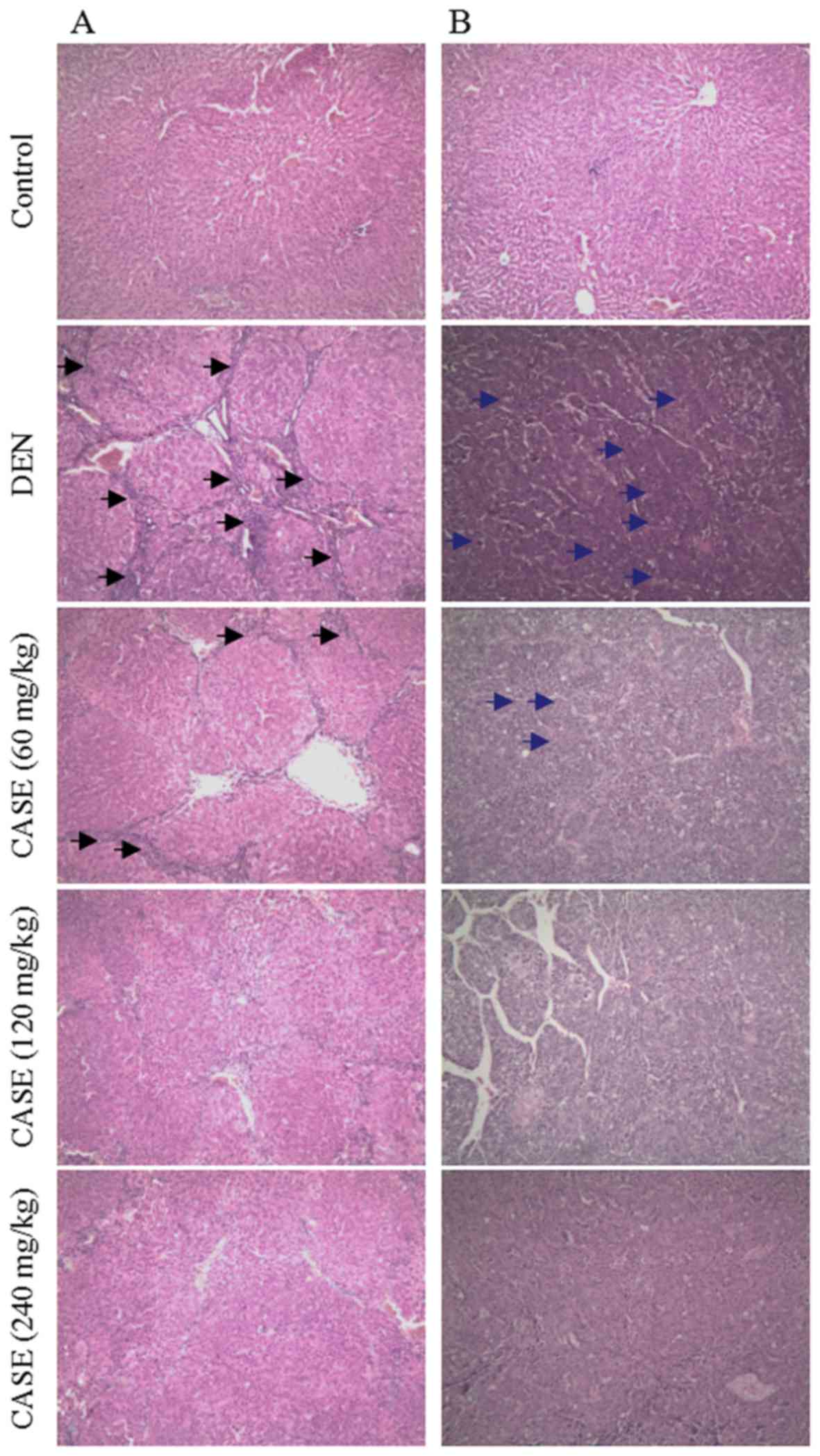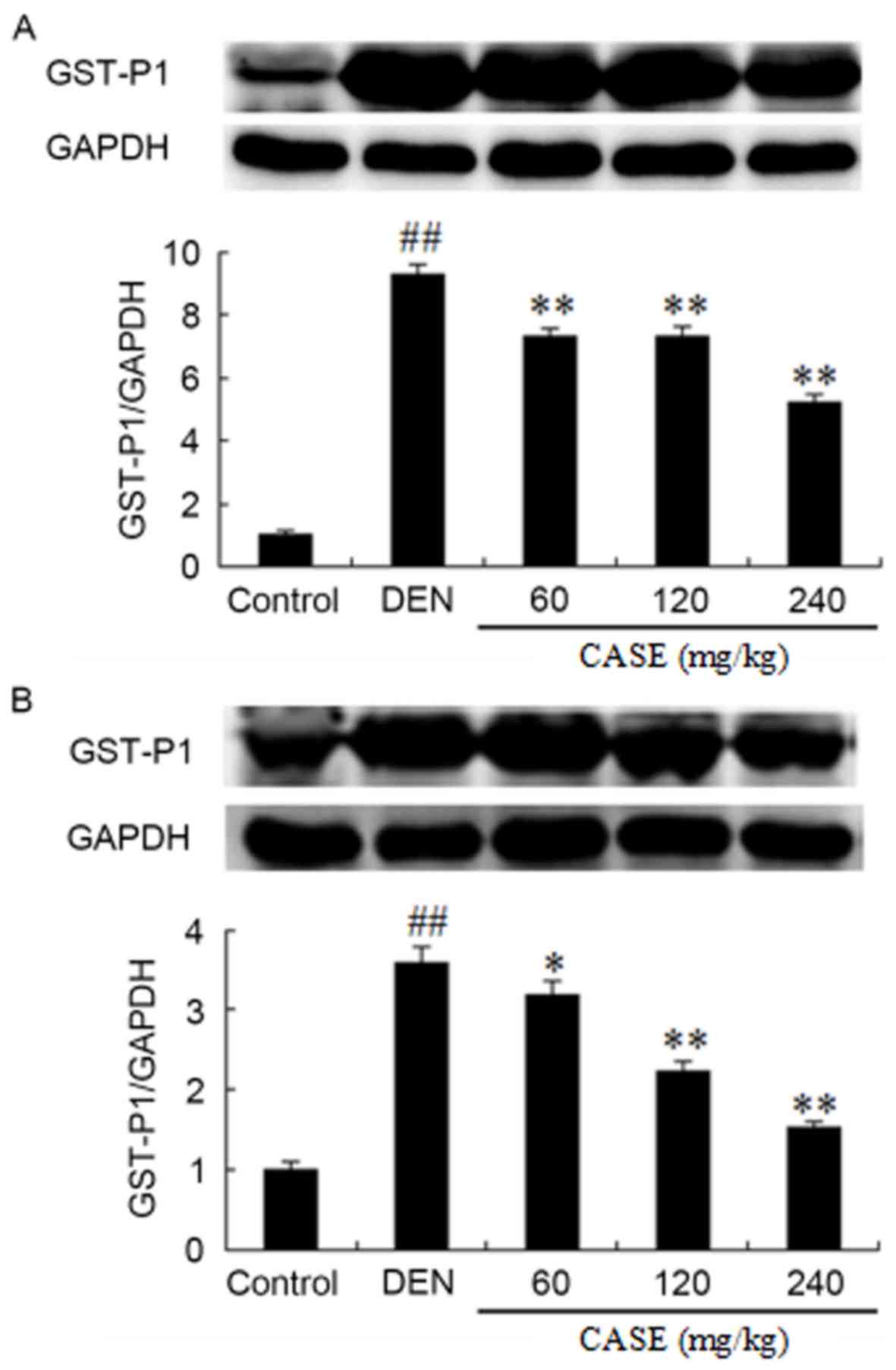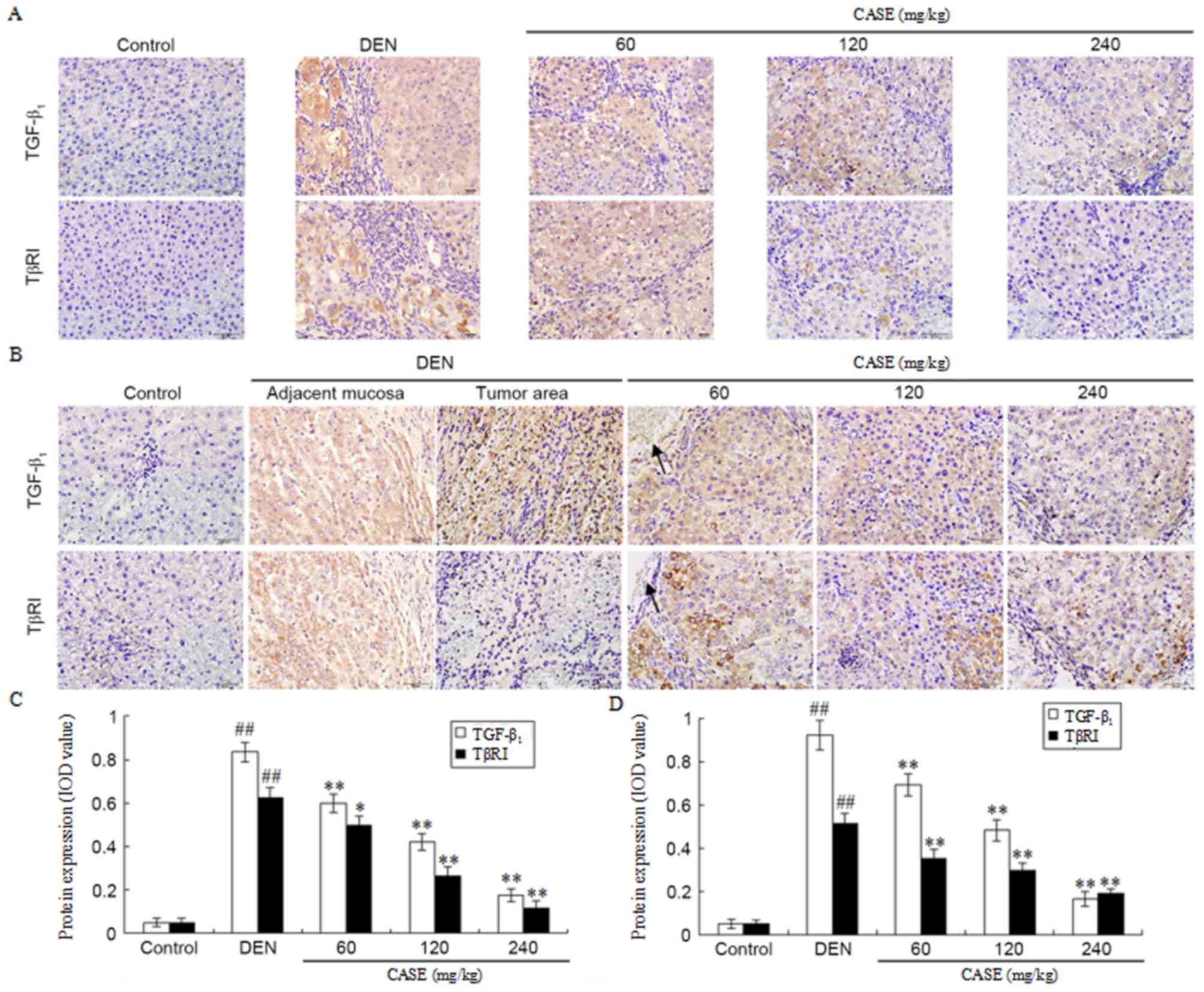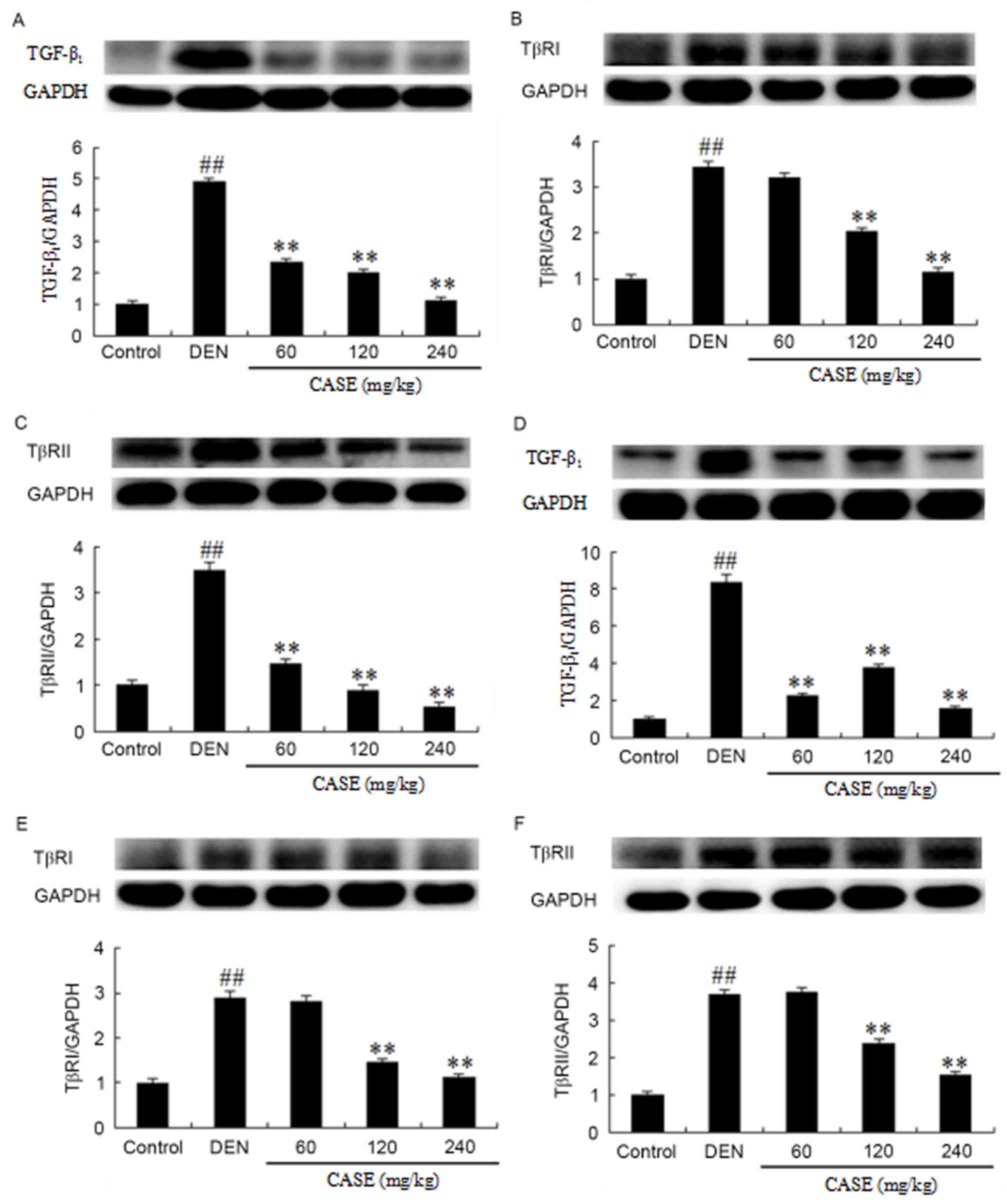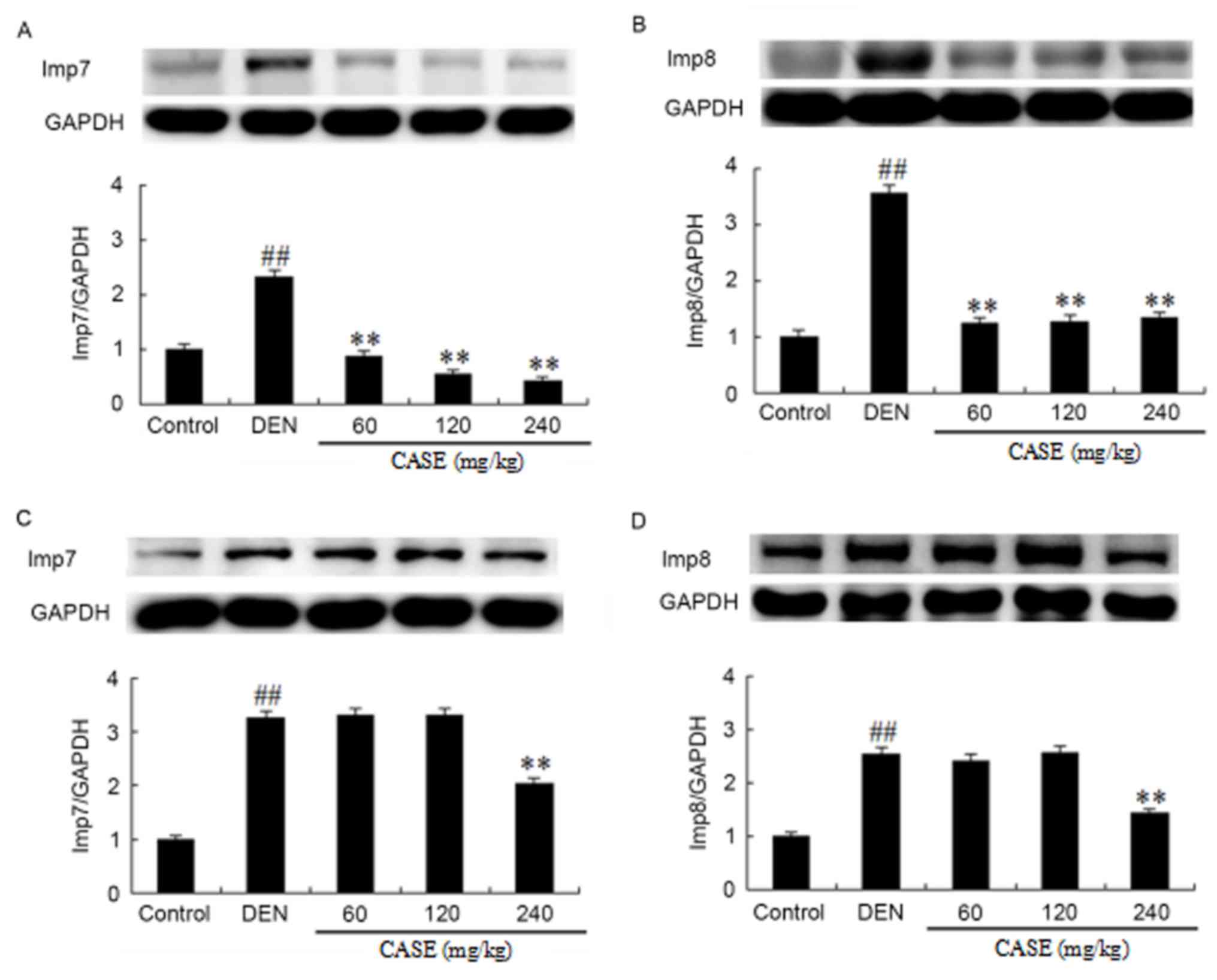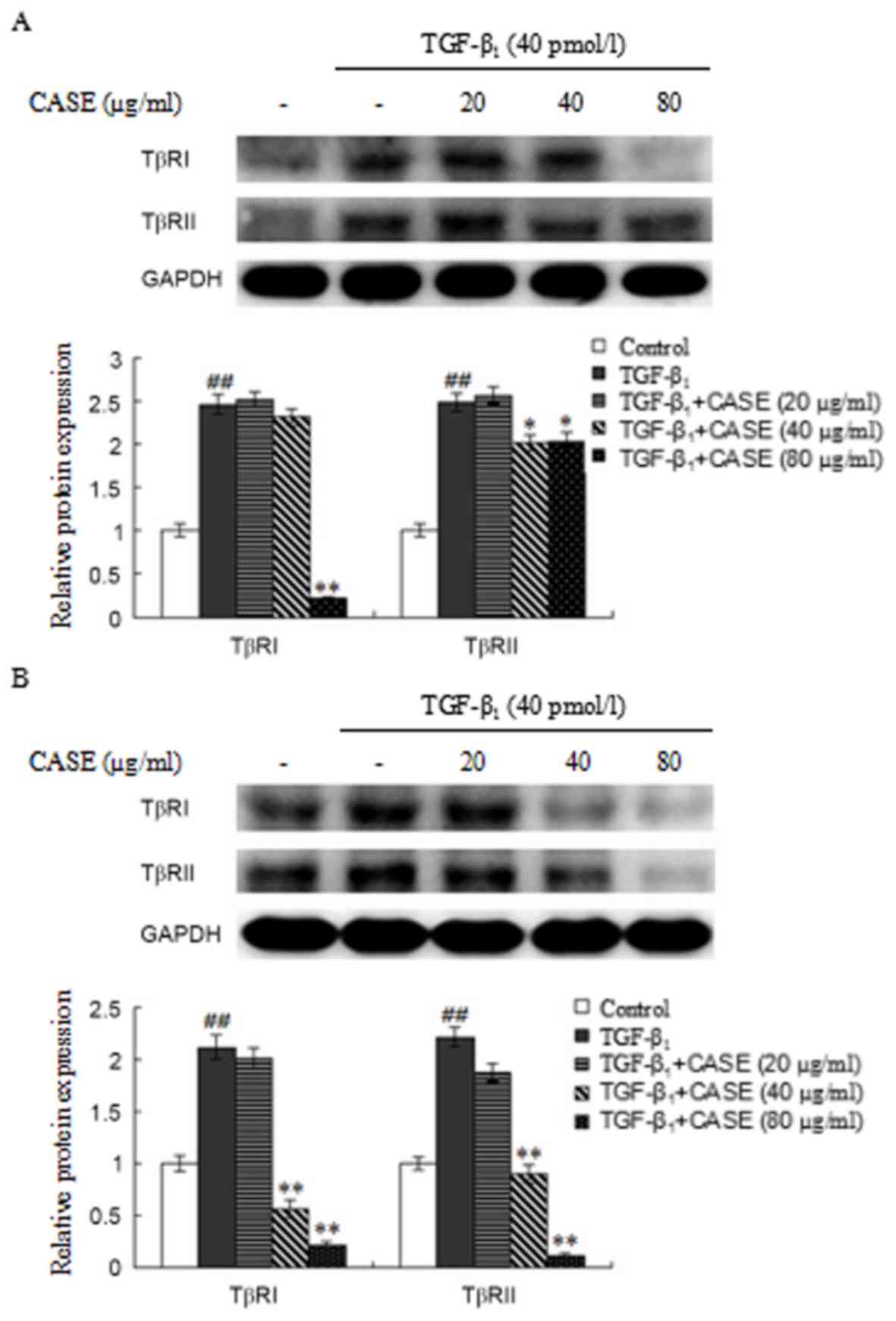|
1
|
Chiang JK and Kao YH: Predictors of high
healthcare costs in elderly patients with liver cancer in
end-of-life: A longitudinal population-based study. BMC Cancer.
17:5682017. View Article : Google Scholar : PubMed/NCBI
|
|
2
|
Kirstein MM and Vogel A: The pathogenesis
of hepatocellular carcinoma. Dig Dis. 32:545–553. 2014. View Article : Google Scholar : PubMed/NCBI
|
|
3
|
Chen KW, Ou TM, Hsu CW, Horng CT, Lee CC,
Tsai YY, Tsai CC, Liou YS, Yang CC, Hsueh CW and Kuo WH: Current
systemic treatment of hepatocellular carcinoma: A review of the
literature. World J Hepatol. 7:1412–1420. 2015. View Article : Google Scholar : PubMed/NCBI
|
|
4
|
Liu H, Wei W, Sun WY and Li X: Protective
effects of astragaloside iv on porcine-serum-induced hepatic
fibrosis in rats and in vitro effects on hepatic stellate cells. J
Ethnopharmacol. 122:502–508. 2009. View Article : Google Scholar : PubMed/NCBI
|
|
5
|
Zhu C, Cao H, Zhou X, Dong C, Luo J, Zhang
C, Liu J and Ling Y: Meta-analysis of the clinical value of danshen
injection and huangqi injection in liver cirrhosis. Evid Based
Complement Alternat Med. 2013:8428242013. View Article : Google Scholar : PubMed/NCBI
|
|
6
|
Rui W, Xie L, Liu X, He S, Wu C, Zhang X,
Zhang L and Yang Y: Compound Astragalus and Salvia
miltiorrhiza extract suppresses hepatocellular carcinoma
progression by inhibiting fibrosis and PAI-1 mRNA transcription. J
Ethnopharmacol. 151:198–209. 2014. View Article : Google Scholar : PubMed/NCBI
|
|
7
|
Yang Y, Yang S, Chen M and Zhang X, Zou Y
and Zhang X: Compound Astragalus and Salvia
miltiorrhiza extract exerts anti-fibrosis by mediating
TGF-beta/smad signaling in myofibroblasts. J Ethnopharmacol.
118:264–270. 2008. View Article : Google Scholar : PubMed/NCBI
|
|
8
|
Zhang XX, Yang Y, Liu X, Wu C and Chen MZ:
Effects of compound traditional Astragalus and Salvia
miltiorrhiza extract on acute and chronic hepatic injury. TANG.
3:15.1–15.5. 2013.
|
|
9
|
Liu X, Yang Y, Zhang X, Xu S, He S, Huang
W and Roberts MS: Compound Astragalus and Salvia
miltiorrhiza extract inhibits cell invasion by modulating
transforming growth factor-beta/smad in HepG2 cell. J Gastroenterol
Hepatol. 25:420–426. 2010. View Article : Google Scholar : PubMed/NCBI
|
|
10
|
Hu X, Rui W, Wu C, He S, Jiang J, Zhang X
and Yang Y: Compound Astragalus and Salvia
miltiorrhiza extracts suppress hepatocarcinogenesis by
modulating transforming growth factor-β/smad signaling. J
Gastroenterol Hepatol. 29:1284–1291. 2014. View Article : Google Scholar : PubMed/NCBI
|
|
11
|
McGrath JC, Drummond GB, McLachlan EM,
Kilkenny C and Wainwright CL: Guidelines for reporting experiments
involving animals: The ARRIVE guidelines. Br J Pharmacol.
160:1573–1576. 2010. View Article : Google Scholar : PubMed/NCBI
|
|
12
|
Yoshida K, Matsuzaki K, Mori S, Tahashi Y,
Yamagata H, Furukawa F, Seki T, Nishizawa M, Fujisawa J and Okazaki
K: Transforming growth factor-beta and platelet-derived growth
factor signal via c-jun n-terminal kinase-dependent smad2/3
phosphorylation in rat hepatic stellate cells after acute liver
injury. Am J Pathol. 166:1029–1039. 2005. View Article : Google Scholar : PubMed/NCBI
|
|
13
|
Furukawa F, Matsuzaki K, Mori S, Tahashi
Y, Yoshida K, Sugano Y, Yamagata H, Matsushita M, Seki T, Inagaki
Y, et al: p38 MAPK mediates fibrogenic signal through smad3
phosphorylation in rat myofibroblasts. Hepatology. 38:879–889.
2003. View Article : Google Scholar : PubMed/NCBI
|
|
14
|
Wu C, Jiang J, Boye A, Jiang Y and Yang Y:
Compound Astragalus and Salvia miltiorrhiza extract
suppresses rabbits' hypertrophic scar by modulating the TGF-β/Smad
signal. Dermatology. 229:363–368. 2014. View Article : Google Scholar : PubMed/NCBI
|
|
15
|
Chen G, Dai ZK, Liang RG, Xiao SJ, He SQ,
Zhao HL and Xu Q: Characterization of diethylnitrosamine-induced
liver carcinogenesis in syrian golden hamsters. Exp Ther Med.
3:285–292. 2012. View Article : Google Scholar : PubMed/NCBI
|
|
16
|
Matsuzaki K: Modulation of TGF-beta
signaling during progression of chronic liver diseases. Front
Biosci (Landmark Ed). 14:2923–2934. 2009. View Article : Google Scholar : PubMed/NCBI
|
|
17
|
Wang Q, Zhai YY, Dai JH, Li KY, Deng Q and
Hen ZG: SAMD9L inactivation promotes cell proliferation via
facilitating G1-S transition in hepatitis B virus-associated
hepatocellular carcinoma. Int J Biol Sci. 10:807–816. 2014.
View Article : Google Scholar : PubMed/NCBI
|
|
18
|
Datta S, Ghosh A, Dasgupta D, Ghosh A,
Roychoudhury S, Roy G, Das S, Das K, Gupta S, Basu K, et al: Novel
point and combo-mutations in the genome of hepatitis B
virus-genotype D: Characterization and impact on liver disease
progression to hepatocellular carcinoma. PloS One. 9:e1100122014.
View Article : Google Scholar : PubMed/NCBI
|
|
19
|
Ren W, Qi X, Yang Z, Han G and Fan D:
Prevalence and risk factors of hepatocellular carcinoma in
budd-chiari syndrome: A systematic review. Eur J Gastroenterol
Hepatol. 25:830–841. 2013. View Article : Google Scholar : PubMed/NCBI
|
|
20
|
Ando N, Shimizu M, Okuno M,
Matsushima-Nishiwaki R, Tsurumi H, Tanaka T and Moriwaki H:
Expression of retinoid X receptor alpha is decreased in
3′-methyl-4-dimethylaminoazobenzene-induced hepatocellular
carcinoma in rats. Oncol Rep. 18:879–884. 2007.PubMed/NCBI
|
|
21
|
De Mattia E, Cecchin E, Polesel J,
Bignucolo A, Roncato R, Lupo F, Crovatto M, Buonadonna A, Tiribelli
C and Toffoli G: Genetic biomarkers for hepatocellular cancer risk
in a caucasian population. World J Gastroenterol. 23:6674–6684.
2017. View Article : Google Scholar : PubMed/NCBI
|
|
22
|
Yu W, Huang C, Wang Q, Huang T, Ding Y, Ma
C, Ma H and Chen W: MEF2 transcription factors promotes EMT and
invasiveness of hepatocellular carcinoma through TGF-β1
autoregulation circuitry. Tumour Biol. 35:10943–10951. 2014.
View Article : Google Scholar : PubMed/NCBI
|
|
23
|
Meindl-Beinker NM, Matsuzaki K and Dooley
S: TGF-β signaling in onset and progression of hepatocellular
carcinoma. Dig Dis. 30:514–523. 2012. View Article : Google Scholar : PubMed/NCBI
|
|
24
|
Hidaka H, Nakazawa T, Shibuya A, Minamino
T, Takada J, Tanaka Y, Okuwaki Y, Watanabe M and Koizumi W: Effects
of 1-year administration of olmesartan on portal pressure and
TGF-beta1 in selected patients with cirrhosis: A randomized
controlled trial. J Gastroenterol. 46:1316–1323. 2011. View Article : Google Scholar : PubMed/NCBI
|
|
25
|
Lee D, Chung YH, Kim JA and Lee YS, Lee D,
Jang MK, Kim KM, Lim YS, Lee HC and Lee YS: Transforming growth
factor beta 1 overexpression is closely related to invasiveness of
hepatocellular carcinoma. Oncology. 82:11–18. 2012. View Article : Google Scholar : PubMed/NCBI
|
|
26
|
Tan Y, Xu Q, Li Y, Mao X and Zhang K:
Crosstalk between the p38 and TGF-β signaling pathways through
TβRI, TβRII and Smad3 expression in plancental choriocarcinoma
JEG-3 cells. Oncol Lett. 8:1307–1311. 2014. View Article : Google Scholar : PubMed/NCBI
|
|
27
|
Liu C, Xu P, Lamouille S, Xu J and Derynck
R: TACE-mediated ectodomain shedding of the type I TGF-beta
receptor downregulates TGF-beta signaling. Mol Cell. 35:26–36.
2009. View Article : Google Scholar : PubMed/NCBI
|
|
28
|
Gramling MW and Church FC: Plasminogen
activator inhibitor-1 is an aggregate response factor with
pleiotropic effects on cell signaling in vascular disease and the
tumor microenvironment. Thromb Res. 125:377–381. 2010. View Article : Google Scholar : PubMed/NCBI
|
|
29
|
Shi Y and Massague J: Mechanisms of
TGF-beta signaling from cell membrane to the nucleus. Cell.
113:685–700. 2003. View Article : Google Scholar : PubMed/NCBI
|
|
30
|
Yao X, Chen X, Cottonham C and Xu L:
Preferential utilization of Imp7/8 in nuclear import of smads. J
Biol Chem. 283:22867–22874. 2008. View Article : Google Scholar : PubMed/NCBI
|
|
31
|
Dong XM, Yin RH, Yang Y, Feng ZW, Ning HM,
Dong L, Zheng WW, Tang LJ, Wang J, Jia YX, et al: GATA-2 inhibits
transforming growth factor-β signaling pathway through interaction
with Smad4. Cell signal. 26:1089–1097. 2014. View Article : Google Scholar : PubMed/NCBI
|
|
32
|
Puche JE, Saiman Y and Friedman SL:
Hepatic stellate cells and liver fibrosis. Compr Physiol.
3:1473–1492. 2013. View Article : Google Scholar : PubMed/NCBI
|
|
33
|
Lee UE and Friedman SL: Mechanisms of
hepatic fibrogenesis. Best Pract Res Clin Gastroenterol.
25:195–206. 2011. View Article : Google Scholar : PubMed/NCBI
|
|
34
|
Mikula M, Proell V, Fischer AN and
Mikulits W: Activated hepatic stellate cells induce tumor
progression of neoplastic hepatocytes in a TGF-beta dependent
fashion. J Cell Physiol. 209:560–567. 2006. View Article : Google Scholar : PubMed/NCBI
|
|
35
|
Qiu GH, Xie X, Xu F, Shi X, Wang Y and
Deng L: Distinctive pharmacological differences between liver
cancer cell lines HepG2 and Hep3B. Cytotechnology. 67:1–12. 2015.
View Article : Google Scholar : PubMed/NCBI
|















